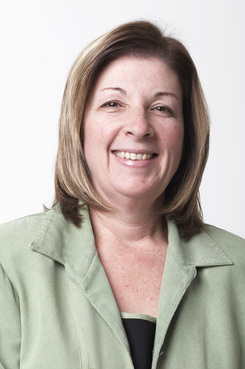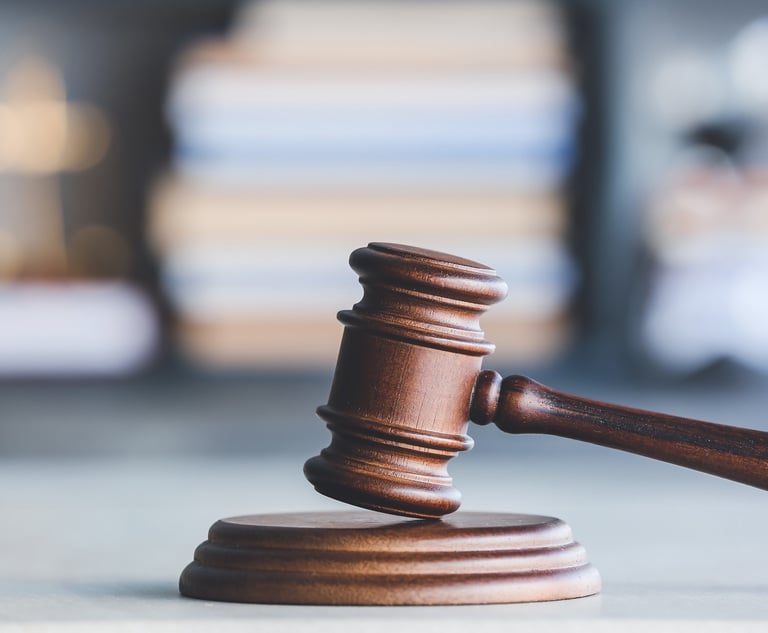Top Women in Law: Barbara Casey
Barbara Casey, a real estate partner in the Cherry Hill office of Ballard Spahr, has earned a reputation as an influential practitioner over the course…
November 02, 2018 at 03:42 PM
3 minute read
 Barbara Casey
Barbara Casey
Barbara Casey, a real estate partner in the Cherry Hill office of Ballard Spahr, has earned a reputation as an influential practitioner over the course of her 33-year career, including a recent engagement in which she led a team of lawyers from multiple offices on a $90 million brownfields redevelopment project. The matter recently closed. She also has done pro bono work for nonprofits including Habitat for Humanity of Burlington County, and has shown commitment, as a Rutgers Law School alum and through other organizations, to advancing the cause of women in the profession.
What's your single best piece of advice for handling a crisis?
Remain calm and keep the situation and the goals in perspective. Even the most difficult situation has a solution. Don't let the crisis control how you reach that solution.
Name a mentor or someone you admire, and why.
My mother. She was a single mother in the 1960's in the Midwest, where society did not look kindly on single mothers. She gave me the tools and support to be anything I wanted to be and to succeed in a world where women were pushed to traditional roles (teacher, nurse, stay-at-home wife and mother). She often worked three jobs at a time to support us but always made the time to participate in anything I asked her to do. Thanks to Mom, I always believed I could do anything I put my mind to.
Best advice you ever got…
Always own up to your mistakes and in the process offer a solution. People expect you to deny that you made a mistake or to admit fault and are genuinely surprised when you admit that you made a mistake and offer a solution to make it right.
What has the #MeToo movement meant to the legal profession?
This legal conflict here is huge. While every person and certainly every woman must be encouraged to fight for their right to not be harassed or assaulted, we must preserve the basic foundation of our legal system—you are innocent until proven guilty. The use of social media and the press' thirst for headlines result in the trial, conviction and punishment of the accused without any due process. There are countless individuals who were sent to prison on nothing more than an eye-witness account and who have subsequently been proven to be innocent, so there is clear evidence that this injustice is not the answer. And the political motive behind some of this is very troubling. The account of the accusations against the Duke Lacrosse team is a chilling example of just how far those political motives can go and how much damage they can do. We, as the guardians of the law, need to balance these fundamental rights for all involved.
In 50 words or less, what does the legal profession need to do to improve opportunities for women lawyers?
Women lawyers still struggle to balance their professional and personal lives—many leave the practice because they cannot achieve an acceptable balance. We need to be more creative in offering tools to help female lawyers find that balance. Fortunately, Ballard Spahr recognizes this challenge and has implemented programs to help.
This content has been archived. It is available through our partners, LexisNexis® and Bloomberg Law.
To view this content, please continue to their sites.
Not a Lexis Subscriber?
Subscribe Now
Not a Bloomberg Law Subscriber?
Subscribe Now
NOT FOR REPRINT
© 2025 ALM Global, LLC, All Rights Reserved. Request academic re-use from www.copyright.com. All other uses, submit a request to [email protected]. For more information visit Asset & Logo Licensing.
You Might Like
View All
Law Firms Look to Gen Z for AI Skills, as 'Data Becomes the Oil of Legal'



Trending Stories
- 1Uber Files RICO Suit Against Plaintiff-Side Firms Alleging Fraudulent Injury Claims
- 2The Law Firm Disrupted: Scrutinizing the Elephant More Than the Mouse
- 3Inherent Diminished Value Damages Unavailable to 3rd-Party Claimants, Court Says
- 4Pa. Defense Firm Sued by Client Over Ex-Eagles Player's $43.5M Med Mal Win
- 5Losses Mount at Morris Manning, but Departing Ex-Chair Stays Bullish About His Old Firm's Future
Who Got The Work
J. Brugh Lower of Gibbons has entered an appearance for industrial equipment supplier Devco Corporation in a pending trademark infringement lawsuit. The suit, accusing the defendant of selling knock-off Graco products, was filed Dec. 18 in New Jersey District Court by Rivkin Radler on behalf of Graco Inc. and Graco Minnesota. The case, assigned to U.S. District Judge Zahid N. Quraishi, is 3:24-cv-11294, Graco Inc. et al v. Devco Corporation.
Who Got The Work
Rebecca Maller-Stein and Kent A. Yalowitz of Arnold & Porter Kaye Scholer have entered their appearances for Hanaco Venture Capital and its executives, Lior Prosor and David Frankel, in a pending securities lawsuit. The action, filed on Dec. 24 in New York Southern District Court by Zell, Aron & Co. on behalf of Goldeneye Advisors, accuses the defendants of negligently and fraudulently managing the plaintiff's $1 million investment. The case, assigned to U.S. District Judge Vernon S. Broderick, is 1:24-cv-09918, Goldeneye Advisors, LLC v. Hanaco Venture Capital, Ltd. et al.
Who Got The Work
Attorneys from A&O Shearman has stepped in as defense counsel for Toronto-Dominion Bank and other defendants in a pending securities class action. The suit, filed Dec. 11 in New York Southern District Court by Bleichmar Fonti & Auld, accuses the defendants of concealing the bank's 'pervasive' deficiencies in regards to its compliance with the Bank Secrecy Act and the quality of its anti-money laundering controls. The case, assigned to U.S. District Judge Arun Subramanian, is 1:24-cv-09445, Gonzalez v. The Toronto-Dominion Bank et al.
Who Got The Work
Crown Castle International, a Pennsylvania company providing shared communications infrastructure, has turned to Luke D. Wolf of Gordon Rees Scully Mansukhani to fend off a pending breach-of-contract lawsuit. The court action, filed Nov. 25 in Michigan Eastern District Court by Hooper Hathaway PC on behalf of The Town Residences LLC, accuses Crown Castle of failing to transfer approximately $30,000 in utility payments from T-Mobile in breach of a roof-top lease and assignment agreement. The case, assigned to U.S. District Judge Susan K. Declercq, is 2:24-cv-13131, The Town Residences LLC v. T-Mobile US, Inc. et al.
Who Got The Work
Wilfred P. Coronato and Daniel M. Schwartz of McCarter & English have stepped in as defense counsel to Electrolux Home Products Inc. in a pending product liability lawsuit. The court action, filed Nov. 26 in New York Eastern District Court by Poulos Lopiccolo PC and Nagel Rice LLP on behalf of David Stern, alleges that the defendant's refrigerators’ drawers and shelving repeatedly break and fall apart within months after purchase. The case, assigned to U.S. District Judge Joan M. Azrack, is 2:24-cv-08204, Stern v. Electrolux Home Products, Inc.
Featured Firms
Law Offices of Gary Martin Hays & Associates, P.C.
(470) 294-1674
Law Offices of Mark E. Salomone
(857) 444-6468
Smith & Hassler
(713) 739-1250






